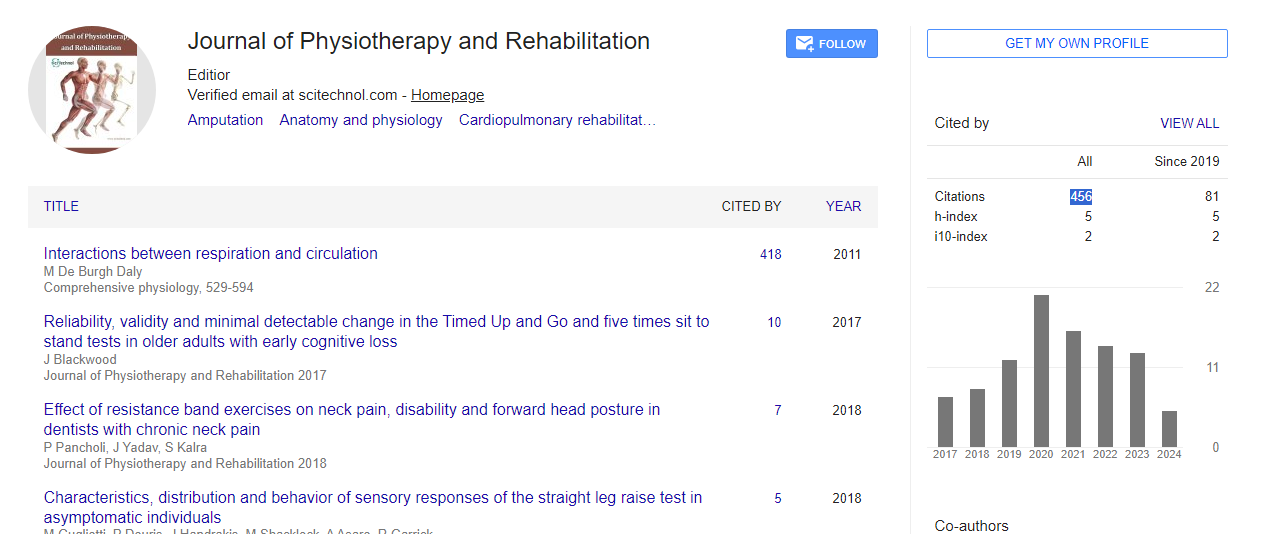Opinion Article, J Physiother Rehabi Vol: 8 Issue: 2
Role of Physiotherapy in Mental Health Care: Integrating Physical and Psychological Well-Being
Shane Li*
1Department of Rehabilitation Sciences, Universidad San Sebastián, Santiago, Chile
*Corresponding Author: Shane Li,
Department of Rehabilitation Sciences,
Universidad San Sebastián, Santiago, Chile
E-mail: lish@ne.ch
Received date: 27 March, 2024, Manuscript No. JPTR-24-135083
Editor assigned date: 29 March, 2024, PreQC No. JPTR-24-135083 (PQ);
Reviewed date: 12 April, 2024, QC No. JPTR-24-135083
Revised date: 19 April, 2024, Manuscript No. JPTR-24-135083 (R);
Published date: 29 April, 2024, DOI: 10.4172/JPTR.1000170.
Citation: Li S (2024) Role of Physiotherapy in Mental Health Care: Integrating Physical and Psychological Well-Being. J Physiother Rehab 8:2.
Abstract
Description
Physiotherapy is traditionally associated with the treatment of physical injuries and conditions, its role in mental health care is increasingly recognized and valued. Physiotherapy interventions not only address physical symptoms but also contribute to the overall well-being of individuals with mental health challenges. This article explores the multifaceted role of physiotherapy in mental health care, emphasizing the integration of physical and psychological approaches to promote holistic healing and enhance quality of life.
Physical activity has long been recognized for its positive impact on mental health and emotional well-being. Regular exercise can reduce symptoms of anxiety, depression, and stress while improving mood, self-esteem, and cognitive function. Physiotherapists play a important role in prescribing tailored exercise programs that address the unique needs and abilities of individuals with mental health conditions. By incorporating aerobic, strength training, and flexibility exercises, physiotherapy promotes physical fitness and mental resilience, empowering individuals to better manage their symptoms and enhance their overall quality of life.
Physiotherapy offers a variety of techniques aimed at promoting relaxation, stress reduction, and emotional regulation. Biofeedback, for example, utilizes sensors to monitor physiological signals such as heart rate, muscle tension, and breathing patterns, providing individuals with real-time feedback about their body's response to stress. By learning to modulate these physiological responses through relaxation techniques such as deep breathing, progressive muscle relaxation, and mindfulness, individuals can develop greater self-awareness and control over their stress levels, contributing to improved mental well-being.
Chronic pain often coexists with mental health conditions, contributing to a cycle of physical discomfort and psychological distress. Physiotherapy interventions, such as manual therapy, exercise therapy, and modalities like heat and cold therapy, plays an important role in pain management and rehabilitation. By addressing underlying physical impairments and promoting functional restoration, physiotherapists help individuals with mental health challenges regain mobility, independence, and quality of life. Additionally, by incorporating cognitive-behavioral strategies into pain management programs, physiotherapy enhances coping skills and resilience, empowering individuals to better manage pain-related distress and improve overall well-being.
Social isolation and loneliness are common experiences for individuals with mental health conditions and can have detrimental effects on physical and psychological health. Physiotherapy offers opportunities for social connection and engagement through groupbased exercise classes, community programs, and recreational activities. By attending a supportive and inclusive environment, physiotherapists create opportunities for individuals to connect with others, share experiences, and build meaningful relationships, reducing feelings of isolation and enhancing overall social support networks.
One of the primary goals of physiotherapy in mental health care is to promote functional independence and enhance quality of life. Through personalized treatment plans tailored to the individual's needs and goals, physiotherapists help individuals develop skills and strategies to perform activities of daily living, such as dressing, grooming, and household tasks. By improving physical function and mobility, physiotherapy enhances self-esteem, confidence, and sense of autonomy, empowering individuals to participate more fully in life and pursue meaningful activities and goals.
Collaboration with other mental health care providers is essential for the effective integration of physiotherapy into mental health care. Physiotherapists work closely with psychiatrists, psychologists, social workers, and occupational therapists to ensure coordinated and integrated care for individuals with mental health challenges. By sharing information, coordinating treatment plans, and collaborating on goal setting, interdisciplinary teams maximize treatment outcomes and support individuals on their journey to recovery and well-being.
Conclusion
The role of physiotherapy in mental health care extends beyond the treatment of physical symptoms to encompass the promotion of holistic well-being and recovery. Through physical activity, relaxation techniques, pain management strategies, social engagement, and functional rehabilitation, physiotherapy interventions address the complex interplay between physical and psychological factors in mental health conditions. By integrating physical and psychological approaches, physiotherapists empower individuals to improve their physical health, enhance their mental flexibility, and reclaim their quality of life.
 Spanish
Spanish  Chinese
Chinese  Russian
Russian  German
German  French
French  Japanese
Japanese  Portuguese
Portuguese  Hindi
Hindi 